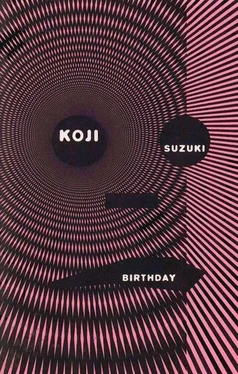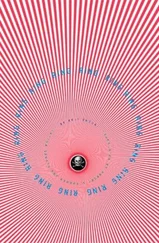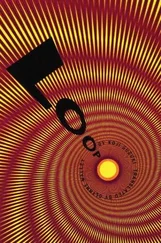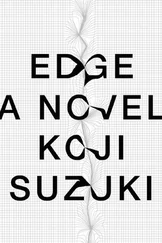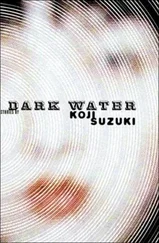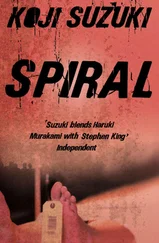Ryuji Takayama's friend Asakawa had told her, in so many words, that a videotape had been involved in his demise. No one bothered to tell her exactly what the connection might be. Perhaps Ryuji watched something so strange, he died of shock—that was the preposterous theory of Mai's concoction. But how else could a videotape cause a man's death? What other explanation could there possibly be?
And otherwise, Asakawa's question made no sense.
He'd asked Mai, since she'd been in contact with Ryuji in his final moments, "He didn't tell you anything there at the end? No last words? Nothing, say, about a videotape?"
He'd made it sound like some videotape had brought about Ryuji's death.
Mai didn't believe it, in the end. And that was why she allowed herself to be led—quite easily at that—into watching it herself.
Ryuji had taught logic at the university. He'd been writing a philosophical treatise and serializing it in a monthly journal. Mai, a student of his, was in charge of making a clean copy of each month's installment for submission; Ryuji's handwriting was all but illegible to anybody who hadn't spent time getting used to it. Mai had volunteered for the job not out of slavish sacrifice but because the task would secure her the honor of being her mentor's first reader.
Ryuji had just finished the final installment when he'd suddenly departed this life. According to Mitsuo Ando, the coroner who performed Ryuji's autopsy, he'd died from sudden myocardial infarction due to a block-age in the coronary artery. But questions remained, and then there was what Asakawa had said. He was Ryuji's friend, and he'd implied that a videotape he'd watched had caused his death. The circumstances of Ryuji's death got murkier and murkier.
Mai, meanwhile, was due to hand in Ryuji's final installment to his editor when she discovered that there were pages missing from the manuscript. This was the conclusion, the wrap-up to a year-long project, and there were pages missing.
She went over his apartment with a fine-toothed comb, with no luck. Her last hope was Ryuji's parents'
home in Sagami Ohno. Immediately after his death, everything in his apartment had been packed up and sent back there; it was the only place she could imagine the missing pages being.
So Mai explained the situation to Ryuji's mother and got permission to visit. Mai was shown to the second floor of the house and to the room that Ryuji had used as a study from elementary school through his sophomore year in college. Ryuji's mother told Mai she could search the room to her heart's content.
Books, clothing, appliances, small pieces of furni-ture: everything Ryuji had had in his one-bedroom apartment was there, stuffed into the cardboard boxes stacked randomly around the room. Mai was looking for a few pieces of paper—they could be anywhere. Foreseeing a lengthy slog, Mai took off her cardigan and set to work.
After a while the search began to seem a pointless one for the proverbial needle in a haystack. But she couldn't think of any other way to plug the gap in the manuscript. She'd just have to keep looking.
But as her will weakened so did her body. Fatigue came into her hunched shoulders. Now and then she thought she could feel someone's gaze fixed on her back, and the sense that she was being watched only grew stronger as the minutes went by.
In high school, she had modeled—just once—for an oil painting by her homeroom teacher, an art instructor.
Needless to say she'd been fully clothed, but all the same she'd had the impression that the teacher's gaze had passed right through her clothing to lap at her skin, indeed to penetrate right to her skeletal structure. She'd known a curious arousal, half embarrassment and half rapture. Later she'd heard that when painting a person's head, the artist's eyes are really seeing the skull. Her intuition hadn't been far off and she'd thought, That stare of his saw straight to my pelvic bone.
That same powerful, razor gaze was boring into her back, penetrating her skin, gouging away her flesh, trying to feel her bones.
Mai couldn't bear it any longer. She turned around.
Behind her she saw a black object, half covered by the pink cardigan she'd taken off prior to beginning her search. She'd placed her cardigan on the object without noticing it.
She moved the garment to reveal a black-bodied VCR. The unit wasn't turned on, but its pilot light glowed a dull red. Mai remembered what Asakawa had said to her.
He didn't tell you anything there at the end? No last words? Nothing, say, about a videotape?
Those words urged her to it. She turned on the video deck.
She began to think, gradually with greater certainty, that she was there because she was supposed to be there.
It was no accident, but a necessary thing.
Now that she thought about it, the shape of the rooftop fissure where she was resembled a videocassette.
A long, narrow rectangle. No, that wasn't quite it. It was more accurate to say that it was shaped like the case of a videocassette.
She wasn't sure what the purpose of the hole was in terms of the building's design. An exhaust shaft, maybe a drainage shaft? Skyscraper construction was a field she knew nothing about. She could hear the whine of a motor beneath the concrete, which suggested the building had an elevator. She was somewhere near the machine room, then. She knew that much.
The sky suddenly brightened, going from a whitish to a truer blue. A line that divided light from shadow was crossing the shaft wall fast enough that she could actually see it advancing downward. Light was moving into the giant videocassette case.
Mai recalled the moment at Ryuji's parents' house when she'd taken the tape from the VCR. She'd plugged in the machine, turned it on, and pressed eject. A
kachunk, and the tape popped out like a child sticking its tongue out at her.
She remembered the touch of it, hard, inorganic but strangely warm. She'd only just turned on the power, but it communicated to her fingers an almost living heat.
A title was written on the spine.
Liza Minnelli, Frank Sinatra, Sammy Davis, Jr. /1989.
The handwriting wasn't very good, and she didn't think the inscription described the contents of the tape.
She doubted it actually contained a concert. Most likely someone had recorded something else over it, but left the title.
What she regretted most now, more than watching the tape, was sneaking it out of Ryuji's parents' house and taking it home with her. Why couldn't she just leave it alone? She'd gone there to find those missing pages.
She should have ignored the odd tape. The moment she took it home with her, her fate was sealed: sooner or later, she'd watch it.
The line descended along the wall of the shaft in leaps. Suddenly, the light hit her straight in the eyes. The sun was directly overhead now.
Time was flying; it was not passing in an analog manner. She'd awakened only just now, in the early morning, but the sunlight had reached the bottom of the hole. It had to be noon or thereabouts.
She lifted her left arm, weakly. No wristwatch.
She'd have to tell time by the position of the sun.
She was probably still losing memory—a block at a time. That would explain the jerky, disjointed passage of time. She was alternating between awareness and blank-outs. She'd spent the hours since her first awakening in a state of idleness, drifting in a daze or lost in flashbacks.
But now she knew exactly what she had to do.
I need to figure out how to get out of here.
She'd die if she didn't escape—and death would come slowly, at its leisure, nibbling away at her soul.
Читать дальше
